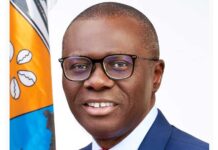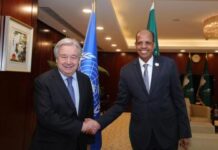Crème de la crème from across Nigeria gathered in Ilorin on Thursday for the Kwara Education Futures Summit, with Governor AbdulRahman AbdulRazaq saying the summit had been called to “analyse the current state of education in Kwara State and develop actionable plan to build a new generation of leaders who can hold their own anywhere in the world.”
World Bank Senior Education Specialist Dr. Tunde Adekola commended the government for the initiative and its commitment of more than 25% UNESCO budgetary funding to education, adding however that it must invest in technology, training and retraining of teachers, create a regime of incentives for good performance, and involve communities in its drive to transform education in the state.
“Government has to invest wisely and smartly to be able to secure the future of our children. There is also the need for a coalition between the state and non-state actors to chart a sustainable course for an improved education system. Teachers have to go through proper training and retraining to raise them professionally,” Adekola said.
He also called for resuscitating the regime of accountability in the schools, including key performance indicators to measure performance and adherence to rules.
“The second thing that worked for Kwara before and can still work now is the coalition. We all have to rally round a shared vision and shared mission for inclusive education and secure the future of our children,” according to Adekola, a global educational leader.
“Kwara State has the highest number of basic schools in the whole of north central. Kwara State has the least number of out of school children in the north central zone of Nigeria. Kwara State is one of those states that are investing more than 20% of its budget in education. Thank you Mr. Governor for the investment in education for Kwara State children.
“Kwara State is one of those states that is coming up from behind in accessing all the fundings in UBEC and is now investing in infrastructure and learning materials. All these things do not come by accident. That is what is called leadership. That is what we need at all levels in the state. That is why the governor brought all of us here to share knowledge and information, to see how we can make things better.”
The summit was attended by the Governor; Deputy Speaker of the Kwara State House of Assembly Raphael Adetiba; Special Adviser to the President on Social Investments Mariam Uwais; state cabinet members; Permanent Secretaries; Senior Special Assistant to the President on Education Interventions Fela Bank-Olemoh; Prof Lasiele Yahaya of University of Ilorin; SUBEB chairman Prof. Shehu Adaramaja; TESCOM chairman Taoheed Bello; Dr. Kunmi Wuraola of Africa-New Globe Education; Nigerian Country Director of Nexford University Olamidun Majekodunmi; Michael Oglegba of Study Lab; Rector of IVTEC Dr. Ade Somide; top educationist Elder Philip Adigun; Bola Lawal of Come Learn AM &ScholarX; traditional rulers; and several other educationists and dignitaries.
The summit was held under three main themes: Current state of education in Kwara State — navigating the current challenges and successes, deep diving into policy, infrastructure, budget and planning, resources; Re-imagine Education in Kwara, which defined the potential, possibilities and partnerships of education in Kwara State. How can we ensure quality education and make schools ready for 21st century best practices?; Education in the future. Innovation and Technology: How can we leverage technology to improve learning outcomes and innovation in education. Each of the theme had its panels comprising educationists and administrators.
In his address to the summiteers, the Governor said the administration has moved basic education from the near collapse state in 2019 with investments in infrastructure, recruitment of good teachers, and reinvigoration of the monitoring system in the schools.
“Two years down the road, my team and I are proud to report that the situation has changed. We have restored our relationship with key partners after years of blacklist. We have reshaped public perception about teaching by engaging the best minds into the system. Work is ongoing in some 600 basic schools to give our children a befitting learning environment,” he said.
“Our goal is to make public schools the first choice for all in terms of the quality and relevance of our infrastructure and teaching staff in the digital age. As a show of our commitment to education, we have recently surpassed the UNESCO budgetary threshold of 26%. Even so, it is clear that the government cannot do this alone.
“Huge gaps still exist. For instance, our recent school census across four local gobernment areas show that 41% of our teachers are absent at their duty post. No single teacher was seen in 54 of the 368 schools sampled, while 23% of students on head teachers’ record were not in school during the census. Only 15% of the schools sampled were rated as needing no repair, implying that 85% of our classrooms require various forms of rehabilitation. The picture is bleaker when you consider availability or adoption of technology in our schools. The gender parity index for ratio of girls to boys in our school is another source of worry.
“So, we need everyone on board. We do not have all the answers. And we certainly do not have enough resources that will provide the right environment for every Kwara child to thrive in the new world, irrespective of their social standing.
“Already, we are building a legal framework to support our efforts. We now have a bill for a law to establish Kwara State Education Trust Fund. When passed, this fund will supplement the sector’s finance, promote technologies, and leapfrog the sector’s development through our Kwara Education Transformation Agenda (KWETA) plan.”
Uwais called for collaborative efforts among traditional rulers, civil society organisations, governments and religious scholars in addressing the issue of out-of-school children through facilities in agriculture, sports, and creativity sectors.
“The children who are out on the streets without education, without any skill and many of them now going to young adults are the ones easily exposed to violence, to crimes and other forms of abuse. This has led the federal government to take decisions on how to support states to curb a lot of these challenges. It is very important for states to lead giving the mandate in the constitution since primary education, primary health care and agriculture fall within their purview. For that reason, it is important for states to take the lead in addressing many of these challenges that these children have,” she said.
“It is also important that we have multidimensional approach for many of these children especially the older ones. So, how do we support them? How do we get them empowered? It is very important for us to have a data to build community to have child agents and child facilitators within communities.”
Bank-Olemoh called on the state government to improve investment in human capital development and create a model that supports and allows private sector to solve problems in the sector.
“It is exciting that Kwara is committing 25% of its annual budget to the education sector. That is fantastic. In the areas of human capital development and educational index, the government should improve. So, we must commit to improving the quality of education that we are imparting. It is also important that the government think in different ways by making tough decisions to redesign the educational system,” he said.
“Technical and vocational education and training (TVET) is important to give our people skills. We must create a TVET system in Kwara that makes it impossible for any students that leave primary school or secondary school without TVET skills. It must not happen in order to change educational outcomes.”
Adigun stressed the need for capacity building for teachers to improve quality education in compliance with global best practices and industry standards.
“There is a need for coherence in capacity building development efforts so that organisations at the state level and development partners are not working at cross purposes,” Adigun added.
Other panelists at the Summit harped on the need to focus on value addition, critical mass of champions, quality assurance, partnership among stakeholders, more investments in human capital development and technical and vocational and monitoring of schools,
The Commissioner for Tertiary Education, Science and Technology Senior Ibrahim Sulaiman, for his part, said the present administration has been able to create an enabling environment for education to thrive which is made possible through the resilient effort of Governor AbdulRazaq.
“I hereby call on all well-meaning Kwarans as well as our invited guests to see this education summit as an opportunity to contribute their own quota to the development of education in Kwara State. I will like to assure you that your honest and sincere contributions will go a long way in giving education a new leap in Kwara State,” he said.






